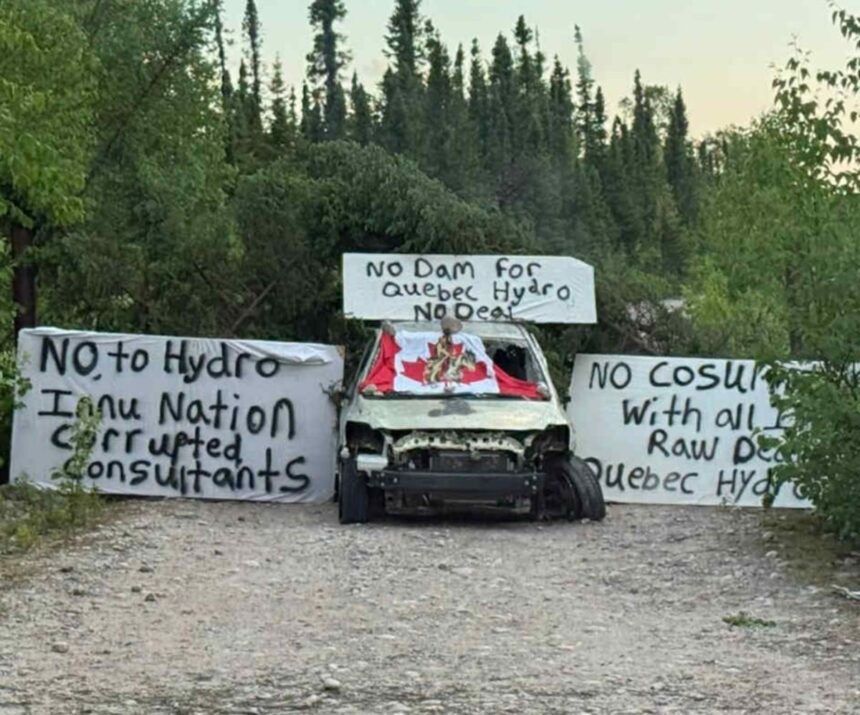On a foggy Tuesday morning last week, I watched Marie Penashue raise her weathered hands toward the sky, singing a traditional Innu mourning song. Behind her, the waters of the Churchill River thundered over jagged rocks, the sound almost drowning out her voice. Almost – but not quite.
“This river has fed our people for thousands of years,” she told me after finishing her song, her breath visible in the early morning chill. “The salmon, the stories, the medicine plants along the shore – they can’t survive another dam.”
Marie was one of approximately 200 protesters who gathered at the proposed site of Hydro-Québec’s new $8.5 billion hydroelectric project in central Labrador. Their encampment, now entering its third week, has succeeded in temporarily halting preliminary development work on what would be one of the largest infrastructure projects in eastern Canada.
Yesterday, Hydro-Québec officially announced the suspension of all site preparation activities after protesters blocked access roads and established a permanent presence at key construction zones.
“We are pausing operations to ensure the safety of all involved and to create space for meaningful dialogue,” said Jean-François Tremblay, Vice President of Community Relations at Hydro-Québec, in a written statement. “We remain committed to building this project with respect for Indigenous rights and environmental standards.”
But for the coalition of Innu Nation members, environmental activists, and local residents who have maintained their blockade through rain and unseasonably cold temperatures, the pause represents a significant, if temporary, victory in a battle they’ve been fighting for nearly a decade.
“We don’t want dialogue about how to build it better – we want this project canceled,” explains Isaac Rich, an Innu Nation councilor who has emerged as one of the protest’s key organizers. “Our people have already lost too much land to megaprojects that primarily benefit southern cities.”
The proposed 1,100-megawatt generating station would be the third major hydroelectric development on the Churchill River system. The existing Churchill Falls facility and the controversial Muskrat Falls project have already transformed vast stretches of traditional Innu and Inuit territories.
According to Environment Canada data, the combined flooding from these previous projects submerged more than 1,300 square kilometers of boreal forest and wetlands. The new project would flood an additional 280 square kilometers – an area roughly the size of Montreal.
Walking through the protest camp last Wednesday, I noticed hand-painted signs in three languages – Innu-aimun, English, and French. Children played between canvas tents while elders tended fires that have burned continuously since the occupation began on June 21, National Indigenous Peoples Day.
Dr. Leanne Harper, a hydrologist from Memorial University who has studied the Churchill River watershed for fifteen years, told me the protesters’ environmental concerns are well-founded.
“The cumulative impact of another large dam on this river system could be catastrophic for remaining fish populations,” Harper explained as we looked out over the rapids. “Our research indicates that methylmercury contamination from the Muskrat Falls reservoir is still affecting downstream communities. Adding another reservoir to this system risks compounding these problems.”
Methylmercury, a neurotoxin formed when microbes convert mercury in flooded vegetation and soils, has been a significant concern since the completion of the Muskrat Falls project in 2019. Health Canada monitoring has detected elevated levels in traditional foods harvested downstream, including fish and seal meat.
For Clara Mistanapeo, a 28-year-old mother of two who has camped at the site since day one, the health implications hit close to home.
“My grandmother taught me which plants along this river can heal sickness,” she said, showing me a collection of carefully dried roots in her tent. “But now we’re afraid to gather medicine or fish here. The water looks the same, but we know it’s changed.”
Hydro-Québec maintains that the project is essential to meet growing energy demands and support Quebec’s transition away from fossil fuels. The utility has signed preliminary agreements to export power to New England, where states like Massachusetts have established aggressive decarbonization targets.
Premier François Legault has repeatedly cited the project as critical to Quebec’s economic future, promising it will create over 7,000 construction jobs and generate billions in revenue over its lifespan.
“We understand there are concerns, but this project represents clean energy that will help address climate change,” Legault said during a press conference in Quebec City last month. “We’ve conducted extensive environmental reviews and are offering significant benefits to affected communities.”
Those benefits include a proposed $675 million compensation package for the Innu Nation, though internal documents obtained through access to information requests reveal significant disagreement within Innu communities about whether monetary compensation adequately addresses their concerns.
Back at the protest camp, elder Peter Penashue (no relation to Marie) explained why many Innu reject the government’s framing of hydroelectricity as “clean” energy.
“When they flood our land, it’s not just trees that disappear,” he said, pointing to ancient stone tools his grandfather found along this stretch of river. “It’s our history, our burial sites, our connection to ancestors. How do you put a price on that?”
The standoff has drawn support from climate justice organizations and Indigenous rights groups across Canada. Last weekend, solidarity rallies were held in Montreal, Toronto, and St. John’s.
Legal experts suggest the protest raises complex questions about consent and consultation in resource development. The Supreme Court of Canada has repeatedly affirmed that the Crown must meaningfully consult Indigenous peoples before approving projects that might affect their rights – though the exact requirements remain contested.
“What constitutes meaningful consultation continues to evolve in Canadian law,” explained Dr. Naiomi Metallic, Chair in Indigenous Governance at Dalhousie University. “But there’s growing recognition that consultation must occur early in the planning process and with the genuine possibility that projects might not proceed if impacts cannot be mitigated.”
As darkness fell on my final evening at the camp, protesters gathered around a central fire. Someone played a drum while others shared stories about what the river means to them. A young woman passed around hot tea in recycled jam jars.
For now, the machinery has stopped. The workers have withdrawn. The future of the project remains uncertain. But as I prepared to leave, Marie Penashue told me she’s ready to stay as long as necessary.
“My ancestors watched this river for thousands of years,” she said, her face illuminated by firelight. “I can watch it for a few more months.”






